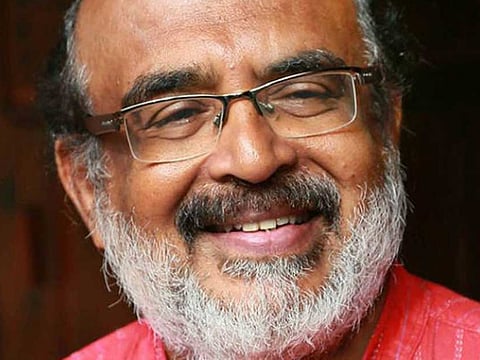Kerala to finish all reconstruction within three years
Flood devastated state will tap NRI funds through ‘masala bonds’, says finance minister

Dubai: The Kerala Government expects to complete all reconstruction forced by last fortnight’s flood havoc within two to three years, according to the state’s Finance Minister Thomas Isaac. It will be followed by a full-scale redevelopment that could take a further three to five years, with the special focus being on infrastructure works.
Only such a drastic overhaul can bring about the desired changes, he said, and one which will help rebuild a shattered economy. “It will be a complete break from the infrastructure we used to have — we want to put in something that will inspire investor confidence,” said Isaac, an economist by profession. “The way to do that is reduce the cost of doing business in Kerala and a first-rate infrastructure can make that happen. China has done that successfully and it’s a model we can emulate.
“The improvements in infrastructure will be taken up on a war footing.”
Persistent rains from August 13 set off floods across the entire stretch of the southern Indian state, which led to a complete disruption of daily life and brought the local economy to a standstill. The state is heavily dependent on certain sectors such as tourism and hospitality, retail and real estate, as well as agriculture. While its industrial base is small compared to some of the other Indian states, the economy relies on remittances sent in from expats in the Gulf.
Talks started on Wednesday with representatives of the World Bank for funds that would help with the rebuilding programme. The talks also involve senior officials from the central government.
“Our target would be to raise around Rs50 billion (Dh2 billion) from WB as soft loans on cheaper interest,” said Isaac. “At the same time, we are in discussions with the central government to raise the limit on the funds that we can tap from such institutions. A figure of Rs150 billion-plus would be handy to get going on the reconstruction works.”
What the eventual cost would be is yet to be finalised. Initial estimates placed it in the Rs200 billion range, but now have swelled to Rs300 billion-plus.
Going forward, the Kerala Government would be calling in for more financial support from non-resident Keralities in the UAE and elsewhere. There are plans to raise fund through the issuing of a “masala bond”, whereby individuals can pitch in with small contributions and on which they can generate future returns.
“Our initial target would be a relatively small Rs50 billion and will be done through the Kerala Infrastructure Investment Board,” said Isaac. “This way we generate floating funds for the state’s short-term needs through this “special purpose vehicle”.
“We had plans for the masala bond for some time and had planned to launch one in October. But the floods delayed the plans and will launch some time in the next few months.
“But we have had so much of support coming in for the Chief Minister’s Relief Fund and to the challenge he laid down — of individuals contributing a month’s salary. The fund has raised Rs8 billion so far and that’s a record collection for any chief minister’s relief fund anywhere in India.”
But there is one thing Isaac and his government will not consider under any circumstances — selling off any assets owned by the state to pay for the funds. “Our policy is quite straightforward — the government’s intention is to run all state-owned industrial enterprises efficiently and make them turn a profit,” said Isaac. “We have managed to achieve operational profits. Selling state enterprises is not negotiable.”
No tax breaks for businesses
* The Kerala Government will not consider offering tax breaks to local businesses to try and kick-start the economy. “All taxes have been subsumed under the central government’s GST (goods and service tax),” said Thomas Isaac, Kerala’s Finance Minister. “The state cannot now offer its own tax incentives in the current tax regime.”
* Once the infrastructure works make headway, it would be time to convince investors and businesses to have a re-look at possibilities in Kerala. The public-private partnership (PPP) model could be an option. “In most other Indian states, the PPP usually works in road development — but given Kerala’s geography and peculiar habitat, it’s almost impossible to make a road toll model work,” said Isaac. “This is why the Kerala state government will take care of the infrastructure works and then once done, get investors to come. We could even offer majority stakes to private businesses in PPP projects.”
* Isaac said there are no plans to bring forward next year’s budget process to January from March because of the current circumstances. “It will clash with the year-end GST process and I don’t want to get into that,” said Isaac. “How GST funds are assigned has far-reaching implications for Kerala. In such a situation, I will prefer sticking with March to announce next year’s budget.”



